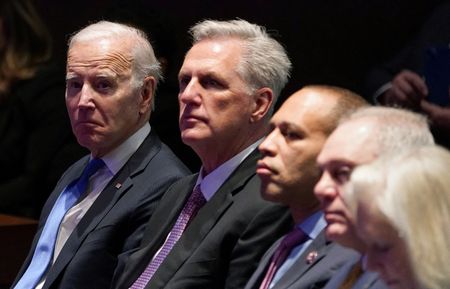 1
1 1
1

By David Morgan
WASHINGTON (Reuters) -U.S. House Republicans put a spotlight on the government’s $31.4 trillion debt in a closed-door meeting on Wednesday, while President Joe Biden pledged more aggressive action on the federal deficit, a day before he was due to unveil his 2024 spending plan.
Democrats and Republicans were expected to hear from the director of the nonpartisan Congressional Budget Office, Phillip Swagel, who has warned the federal debt will surpass the size of the U.S. economy within the next decade if no steps are taken.
Biden, a Democrat who is expected to release his budget on Thursday, raised the plan’s deficit savings forecast to nearly $3 trillion from $2 trillion, hours before the briefing. The plan is expected to extend the life of the Medicare healthcare plan for Americans age 65 and older, while raising taxes on billionaires and other high-income individuals.
Republicans are expected to follow up by April 15, and have been eyeing $150 billion in cuts to nondefense discretionary programs for 2024 that would reset spending to fiscal 2022 levels and save $1.5 trillion over a decade by holding spending increases to an annual 1%.
The emergence of the two budgets are seen as the starting gun for negotiations between House Speaker Kevin McCarthy and Biden over spending for fiscal 2024, which begins Sept. 1.
The stakes of those talks are elevated this year as the federal government is expected to hit the $31.4 trillion debt ceiling by summer. Failure to act by that time could trigger a potentially disastrous default.
McCarthy wants Biden to agree to spending cuts before his narrow Republican House majority would agree to raise the debt ceiling. Biden insists that Republicans must agree to a “clean” debt ceiling increase without a preliminary deal on spending.
“If people know the dire situation we’re currently in, who would ever walk out of that and say you just have to pass a clean debt ceiling?” the California Republican told Reuters.
“We’re at a tipping point,” McCarthy said of the nation’s fiscal position. “Very seldom do we ever get together as members outside the chambers. We do that in classified briefings and … I think this is just as important as any security issue.”
Swagel was expected to appear at Wednesday’s briefing alongside Republican House Budget Committee Chair Jodey Arrington and the panel’s top Democrat, Representative Brendan Boyle.
The briefing was welcomed by outside budget experts. Maya MacGuineas, president of the nonpartisan Committee for a Responsible Federal Budget, called the event “an encouraging step toward educating lawmakers with a shared set of facts on our fiscal outlook.”
TRADING BLAME
Each party blames the other for the country’s fiscal position. Republicans say spending under Biden has added to the national debt, while Democrats point to tax cuts for businesses and wealthy individuals that were passed under former President Donald Trump and cost the budget $2 trillion in revenue.
On Wednesday, the conservative Republican Study Committee circulated a seven-page memo containing scores of ideas for spending cuts and reforms that would cap discretionary spending, deregulate the energy sector, prioritize debt payments and make the Trump tax cuts permanent.
The influential House caucus, which represents nearly 80% of the House Republican conference, is expected to produce its own budget plan in April, independently of Arrington’s proposal.
The White House accused Republicans of planning to add $3 trillion to the deficit, citing its own compilation of Republican legislation that did not take the party’s cost-cutting proposals into account.
Biden and McCarthy last met over a month ago at the White House, and the speaker said he hoped Wednesday’s meeting with Democrats would spur the president to move forward on talks.
Neither Biden’s proposal nor the one Arrington’s committee is preparing would result in a balanced budget.
In a blog post this week, Swagel said Congress could “nearly stabilize” the growth of federal debt by reducing deficits by an average of $500 billion a year for a decade-long savings of $5 trillion, a sum that dwarfs the combined 10-year savings proposed by Biden and Arrington.
Overall, CBO projects that annual deficits will average $2 trillion between 2024 and 2033, approaching pandemic-era records by the end of the decade.
(Reporting by David Morgan; Editing by Scott Malone, Bill Berkrot and Daniel Wallis)